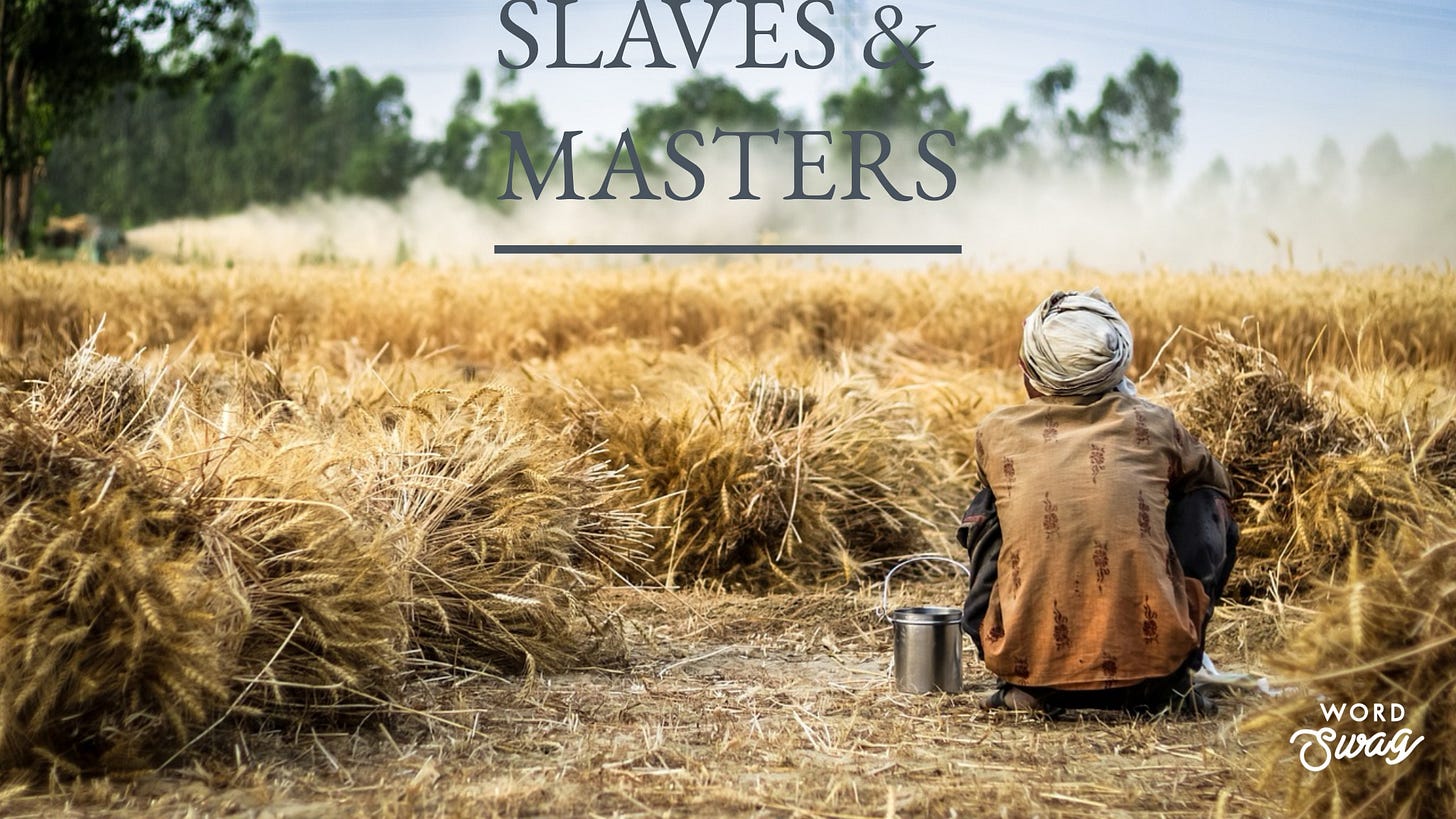Slaves & Masters

Over the past 160 years in the West, we have experienced something rare in the history of the world: Chattel slavery has not only been formally abolished but has become culturally abhorrent. When Americans think of slavery, we think of Africans being sold by their kinsmen to people in the West and that slavery was only of those who had dark skin. But light-skinned eastern European Slavs were enslaved by Muslims. The Irish were slaves in the 1600s in Western lands. Slavery reaches back to the time before Abraham, who himself owned slaves. Even today, throughout the world, it is estimated that somewhere around 40 million people are enslaved. The twentieth and twenty-first-century Christian West is an anomaly in the world.
Because of our relatively sheltered place in history, many Christians are embarrassed about what the Scriptures say and do not say about slavery. We expect there to be an absolute prohibition of slavery throughout Scripture and especially in the New Testament, but there isn’t. In fact, it’s quite the opposite. Paul and Peter direct slaves to obey their masters, and masters are not commanded to free their slaves. The relationship between master and slave is regulated but not eliminated.
When Paul addresses slaves and masters in Colossians 3:22–4:1, he is not a compromiser or blinded by cultural conditioning to accept the present institutions. Paul is not going soft on slavery because he is not an all-or-nothing abolitionist who must see the end of slavery right now. Earlier in the letter, Paul referred to things in the Law as “shadows of things to come, but the substance is Christ” (Col 2:17). Slavery and its end are included in the shadows. As the leaven of the gospel permeates the world, slavery will eventually come to an end, as it has been prophesied in the laws of Sabbath years and Jubilee. Many wrongs must be set right, and many people must be prepared to be set free to become productive in God’s world before slavery ends. But it will end.
One of the means of slavery’s ultimate demise is living as Christian slaves and masters. Paul addresses slaves extensively in a passage in which he gives other household members one-sentence commands (Col 3:22-25). Slaves are commanded to obey their masters (or “lords”) in everything. Motivation for obedience was primarily negative for a slave: avoid punishment or death. Paul gives them greater motivation. Slaves are members of the church, beloved saints, who stand to inherit the kingdom and a place of rule in the future (Col 3:24). Work for their earthly master is work for the kingdom. Even in their lowly position in society, where people thought of them as mere property to be disposed of at the will of their master, whose work was needed while they were disposable, God tells them that their work is not in vain (cf. 1 Cor 15:58). They serve the Lord Christ (Col 3:24). For this reason they ought to obey their masters and work heartily, not merely doing just enough to get by.
Christian masters have the responsibility to image their heavenly Master in relationship to their slaves. They are to treat them with justice and equality, which means at least treating them as fellow humans and not like animals. As all Christians are slaves to our Lord Jesus Christ and are treated as his family, so Christian masters are to treat their slaves as family. Their slaves may be treated like sons or brothers even while they remain in their service.
The principles of work and authority tie Paul’s instruction to slaves and masters to the present day. We are to respect authority structures, particularly in work relationships. Our work should be done with all our heart, seeking what is best for the people for whom we work, whether that is our company or our customers. As Christians, our work should be done excellently, not taking shortcuts or trying to take advantage of others’ kindness or leniency. Christians will sometimes presume upon other Christians in work, thinking that they can be lazy, procrastinate, or expect discounts because the other person is a believer. This should never be the case. We work for the kingdom in everything we do, and our work must always reflect that in its attitude and output.
Christians who employ others should treat people with dignity, not like cogs in a machine, only looking at the bottom line. The bottom line remains important, but it must never be allowed to so control an employer that people are treated as property. This doesn’t mean a Christian employer should have unending patience and never fire someone for cause. Some people need to be fired. However, people need to be treated with dignity and respect, given the best working conditions possible for the job, and compensated as much as the company can afford, commensurate to their value to the company.
Christian masters and slaves, employers and employees are all ultimately in the same business and, therefore, working toward the same end: building the kingdom. The way we do that is to understand our particular callings and work faithfully within them.
The post Slaves & Masters appeared first on Kuyperian Commentary.

